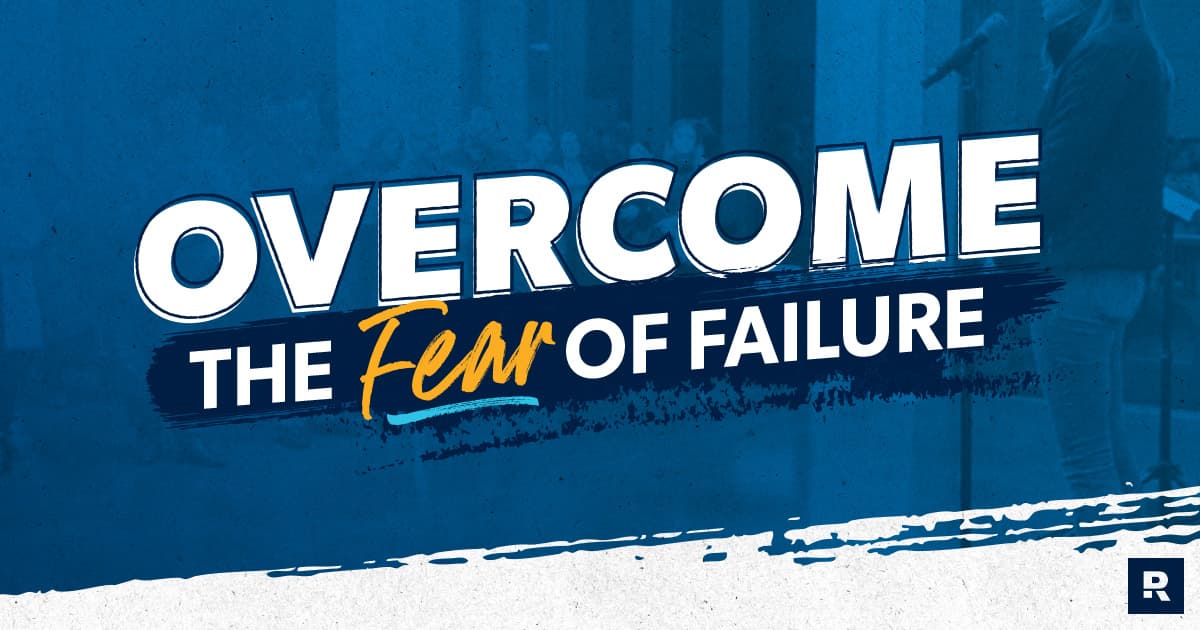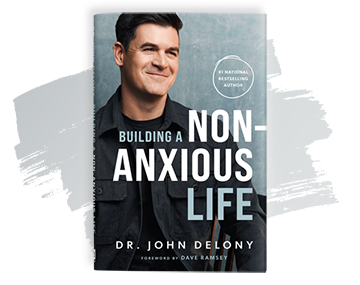11 Ways to Overcome the Fear of Failure
13 Min Read | Jul 17, 2024

So, you’ve got something big on your mind. Maybe you’re dreaming of changing your career path, or you’re weighing a huge business decision. Maybe you got a couple of college acceptance letters, and you’re deciding which school to attend. Or maybe it’s time to take your relationship to the next level, like proposing to the love of your life or starting a family.
Whenever we face a new challenge or opportunity, we also face the fear of failure. What if I don’t have what it takes? What if our new product line is a bust? What if she says no? Listen, whether you’re 18 or 80, we all experience doubts like these—that’s part of life! But you shouldn’t let the fear of failure hold you back from living your best life . Let’s talk about what causes the fear of failure and what practical steps you can take to overcome this fear and get on with your big goals.
What Is Fear of Failure?
Fear of failure, or atychiphobia, is the intense feeling of anxiety or danger around messing up, not measuring up, or being judged by other people for not accomplishing a goal. A fear of failure takes over when someone wants to avoid feeling shame about not getting an outcome they want or expect. We often fear the failure of one-off events or situations, but it can also hang out in the background as a general feeling of anxiety.
How Is Fear of Failure Diagnosed?
If the fear of failure is seriously impacting your life, it might be time to visit a counselor or therapist to learn more about what you’re experiencing. Your fear could be a symptom of general anxiety or something deeper—but only a mental health professional will be able to help you figure out what’s going on and help you overcome it.
Symptoms of a Fear of Failure
The way a fear of failure shows up really depends on the person, but it’ll usually have a few telltale signs, like:
- Feeling on edge or worrying about new or unfamiliar situations
- Avoiding stressful situations completely or withdrawing from opportunities—such as a better job or a fun social event
- Feeling out of control when trying something new
- Experiencing physical symptoms like dizziness, a racing heart, sweating or other signs of anxiety
- Imagining the worst-case scenario
- Feeling intensely self-conscious about what other people think
- Downplaying your plans or minimizing your success to other people
- Procrastinating or getting distracted from what you need to do
- Feeling discouraged about improving or changing anything in the future
- Worrying that people will leave you or replace you with someone you think is better or more qualified
What Causes Fear of Failure?
While everyone struggles with the fear of failure at some point in their life, we all have different backstories connected to that fear. Think about it: Your life experience is totally different from your neighbor’s or coworker’s or parents’. That means you probably fear failure for a different reason than someone else in a similar situation. It’s a good idea to think about the root cause of your fearful emotions. To get you started, here are a few reasons we develop a fear of failure. See if any of these seem familiar to you:
Perfectionism
Often, we don’t want to try something new because we’re afraid of getting embarrassed or not doing it right the first time around—especially if we have high standards for ourselves. (Any overachievers here?) The key to getting over perfectionism is to give yourself permission to be a beginner, which means—yep—not doing everything perfectly on your first try.
Comparison
It’s easy to fear failure when we care a ton about what others think. Instead of focusing on who we want to become, we compare ourselves to people around us. But you’re the only one running your race! You’ve got to stay focused on your lane. Keep those blinders on and charge ahead.
Past Trauma
No one gets through life scratch-free. We’ve all experienced painful things. It makes perfect sense why you might be afraid to put yourself out there again. Who wants to risk a repeat of what happened last time? But as Dr. John Delony says, “Your past is a context‚ not an excuse.” In other words, we can’t blame what happened in our past for what we’re avoiding in our present. At some point, we have to choose courage and move forward.
Free Anxiety Test
This test will help you get clarity on the situations that could be contributing to your feelings of stress, anxiety and burnout.
Belief Systems
We form our values and beliefs at a young age. Your family’s patterns of talking and relating to each other shaped you more than you realize. This gives you a unique perspective on life, which is a good thing! But those family beliefs can also hold us back. For example, if you grew up in a family that put everything on credit cards, then you might struggle to believe you can cut them up and live a life completely without them.
Negative Thoughts
We’re usually our own worst enemy. You probably hear all sorts of discouraging thoughts in your head about who you are and what you can (or can’t) accomplish. When you hear those voices, take a moment to challenge those negative thoughts. Instead of listening to them, swap those negative thoughts with positive ones.
Tying Your Self-Worth to Your Accomplishments
Accomplishment is a fast and easy place to go for a confidence boost. But when you get your worth from what you do, failure can feel like the end of the world. We all need to be intentional to get our sense of self-worth from places besides our jobs and goals—like our character, our relationships and the good we do in the world.
How to Overcome the Fear of Failure
Okay, now that we have an idea of what causes a fear of failure, let’s break this down into 11 practical steps you can take today to overcome the fear of failure.
1. Understand that everyone experiences fear.
We should expect to feel afraid when we’re doing anything meaningful or challenging or new. Fear doesn’t mean you’re doing something wrong—in fact, it probably means you’re doing something right. That’s because the good things in life usually involve some risk. And that can definitely be scary.
Want to build a non-anxious life? Learn how in Dr. John Delony’s new book.
Turning to Scripture for reassurance can be helpful. In 2 Timothy 1:7 we see that “God has not given us a spirit of fear, but of power and of love and of a sound mind” (NKJV). Yeah, feeling fear is normal—but we’re equipped to handle it!
2. Give yourself permission to be a beginner.
Often, fear keeps us from moving forward with our decisions and dreams because we want to be perfect from the start. We want to get promoted, score a 100 on the test, and give a superstar performance on our first try. But here’s the deal: When you start something new, it’s not going to be perfect. And that’s okay!
By giving yourself permission to be a beginner, you can put aside your need to be perfect and just get started. With each small step you take, your confidence will grow and drive your next step.
3. Change your mindset about what failure means.
The docuseries The Last Dance follows the legendary career of Michael Jordan and focuses on his last season with the Chicago Bulls. One of the big themes of the series—and one of the things that’s most admirable about MJ—is how he embraces and learns from his failures. In the show, Jordan explained, “I’ve missed more than 9,000 shots in my career. I’ve lost almost 300 games. Twenty-six times, I’ve been trusted to take the game-winning shot and missed. I’ve failed over and over and over again in my life. And that is why I succeed.”
With the right mindset, failure isn’t the enemy. Instead, it’s a teacher. Any successful person you admire—in business or leadership or sports, or even as a great mom or dad—has experienced a lot of failure. But they didn’t let it stop them.
The reality is, there’s no such thing as a risk-free life. But when we choose to learn from our mistakes, we can let our failures fuel our future successes, just like Mike.
4. Talk to people with experience.
One of the best things we can do when we feel afraid is talk to helpful people. We’ve got to surround ourselves with kind, like-minded folks who can share their wisdom. This could be a friend, mentor, pastor or spouse.
A lot of the time, we get stuck in our own heads about our plans and dreams. It’s easy to get overwhelmed when you’re trying to figure out big decisions on your own. But there’s something about talking about your fear with people who care about you and have life experience that makes it easier to work through.
And if you’re opening up to someone you trust—someone who loves you and who you respect—you’ll get some good perspective and solid advice on next steps to take.
5. Be purpose-driven.
If your fear is holding you back from something important, chances are, it’s holding back other people you can help too. When you have a strong why, you’ll have a strong try. So you’ve got to get clear on your purpose and why you’re doing what you’re doing. Who are you trying to help? What can you do that no one else can? Why is this important?
Let’s say you have a dream of starting a nonprofit or a business, but it feels way too big and scary to wrap your head around. Ask yourself this question: Why am I doing this? There are real people in your family, community and workplace who need what you’ve got to give. But if you let fear win, those people will never get the blessing of what you have to offer.
Even if you’re facing a more personal goal, like getting into shape or working toward a career move, you’re fighting for more than just yourself. Everyone around you benefits when you take good care of you.
6. Weigh the pros and cons.
If you’re not journaling, it’s time to start! When the fear of failure keeps you stuck, whip out that paper and pen and start getting all your fears down on paper. When you weigh the pros and cons of whatever you’re afraid of, you give your brain a chance to get its worries out and think clearly.
Let’s say you want to make a career switch. It can be terrifying to leave a familiar place and step into the unknown—especially if you’re taking a financial risk or moving away from home. But here’s an important thing to keep in mind: When you have good information, you can make a good decision.
So start playing out all the scenarios you can think of around this new opportunity (or whatever situation you’re worried about).
If you still have questions, do more research. Talk to people who have done what you want to do. Give yourself multiple timelines and think of different ways to approach the situation. In the end, you’ll be able to make an educated choice out of confidence, not fear.
7. Ask, What’s the worst that can happen?
When you’re worried about a new project, business idea or personal goal, think worst-case scenario. Ask yourself: What if my worst fears come true? Will I survive? What if nothing goes according to plan? Then what? When you know you’ll survive, the decision isn’t as scary. You know that even if it doesn’t turn out how you hoped, you’ll be okay in the end.
Think of it like this: Once you know you’re not going to die from doing the task or making the decision—even if it goes poorly—you can move forward. You can keep fear quiet by realizing that if you actually do fail, the world will keep spinning. And you can get back up, brush yourself off, and start over with a fresh perspective and the wisdom of experience.
8. Recognize the cost of not trying.
Ever heard this quote by Suzy Kassem? “Fear kills more dreams than failure ever will.” Whew! Isn’t that the truth. Listen, living in fear comes at a cost. It’ll cost you your dreams and hopes and plans—everything amazing you feel inspired to create and be. When you face your fears, you grow. You learn. You come out victorious and changed.
So, you’ve got a choice: Sit on the bench, or get up and be the main character of your own life. Will you experience some failure from time to time? Yes! That’s the price we pay for leaving it all out on the field and giving it our best shot. But your dreams are worth the guts and the glory.
9. Learn to adjust on the fly.
We often fear failure when we feel locked into doing something one way. And if there’s only one right way to do something, of course that feels like a lot of pressure! But learning to be flexible and adapt to challenges can help us avoid failure, or even soften the blow from any mistakes we do make.
Whatever you want to do—like taking on a physical challenge, paying off debt, applying for a new job, ask someone out on a date—will take you down a new and uncertain path. You can’t predict or control what’s going to happen, but there are usually multiple ways to get something done. So be open to shifting your approach and growing through the process.
10. Control what you can control—even when you’re scared.
Nothing will build your confidence and quiet your fear like taking even tiny steps toward that thing you’re afraid of. Focus on what you can control while understanding that some things might happen that you can’t predict! Do your best to prepare, have a plan, and focus on the positive. It’s up to you to show your fear who’s boss. Don’t wait until you’re not scared to do the thing you want to do. Plow ahead, one step at a time. Remember, God gave you a spirit of power, so use it!
11. Break big things down into smaller steps.
It’s easy to fear messing up a giant project or not achieving a big goal. But when you break down overwhelming situations into smaller, bite-sized steps, the size of your fear will shrink too. Suddenly, instead of fearing that you’ll fail to pay off that $100,000 of debt, you can focus on the success of just paying off one debt—the smallest one. Instead of never getting started because the goal of paying off six figures feels so massive, you’ll have already paid off a smaller loan. That’s a success that will keep you moving! Ask yourself: How can I break down my big goals into smaller, more manageable pieces?
Face Your Fears and Move Forward
Listen: Even when you feel stuck, overwhelmed and terrified of doing that thing you want to do, you don’t have to stay stuck. You don’t have to wait until you suddenly feel courageous to take action—taking action is what gives you courage! You can learn to build confidence in yourself and, more importantly, in the God who created you with and for a purpose.
If you’re looking for extra support, Dr. John Delony’s book Building a Non-Anxious Life gives you Six Daily Choices you can make that will help build your confidence. You can even start reading the first chapter for free online, so check it out!
Want to Build a Non-Anxious Life?
For guidance on making the daily choices that will help you be well, check out Dr. John Delony’s new book.
Next Steps
- Having a fear of failure is normal! But it’s how you respond to fear that makes a difference in the situation’s outcome. Find out which situations are causing you to feel stress and anxiety by taking this free Anxiety Test.
- Tap into resources and support when you feel fearful. Do research, talk to mentors, and consider multiple ways to move forward. Check out Building a Non-Anxious Life by Dr. John Delony for practical steps to create a life free from anxiety.
- Remember to give yourself grace. You don’t have to accomplish everything perfectly. Treat failure as an opportunity to learn.




